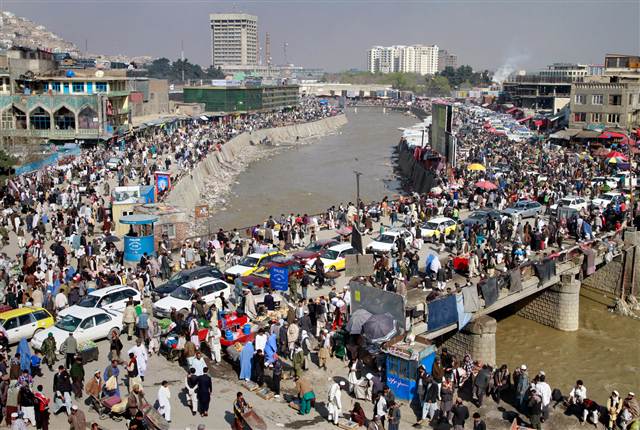AT Monitoring Desk-KABUL: A new survey says that still 61.2 per cent people are pessimistic about the future of Afghanistan, saying their country was going in the wrong direction.
The survey launched by the Asia Foundation, however says that optimism among the Afghans about the direction of their country has slightly increased.
“But at the same time, fears about security and economy affect attitudes about future as a large number of the respondents indicate they would leave the country if afforded the opportunity,” said the survey released Tuesday.
The findings of the survey conducted by the Asia Foundation are based on face-to-face interviews with more than 10,000 Afghan citizens representing all major and most minor ethnic groups in all 34 provinces.
The findings of the 13th Survey of the Afghan People are released amid escalation of attacks in Afghanistan and the US administration’s new strategy for the South Asia region.
Despite some progress, Afghanistan is still the most fragile and volatile country in the region affected by terrorism, second only to Iraq.
The Asia Foundation said its survey was longest-running and broadest of Afghan attitudes on critical issues facing the country.
Since 2004, the survey gathered opinions of more than 97,000 Afghan men and women, providing an unmatched longitudinal portrait of public perceptions of security, economy, governance and government services, elections, media, women’s issues, and migration.
The 2017 survey includes additional questions related to migration and remittances, a significant issue for Afghanistan’s economy.
Despite significant challenges, the survey was conducted in Afghanistan against a backdrop of increasing life expectancy, rising educational attainment, and expanded access to education, especially for girls.
Today, expected educational attainment at birth is 10.1 years, compared to 2.5 years in 2000 under the Taliban. In 2002, Afghanistan had just one million students; today it has 8.7 million, 39% of them female. Life expectancy at birth has increased from 45.3 years in 2000 to 60.7 years in 2017.
“Clearly, Afghans are eager for a better future, and this year’s data reflects a rise in optimism despite the challenging security environment and lack of employment,” said Abdullah Ahmadzai, the Asia Foundation’s country representative in Afghanistan.
“After a historic decline in 2016, confidence in public institutions and the Afghan National Security Forces have slightly improved in 2017,” he added.
The survey also reveals what Afghans see as their immediate priorities: educational development, agricultural development, good security, and the building of roads and bridges are frequently cited as going well at the local level.
“The survey is a map of social change over time, presenting a clear picture of the gains and gaps that Afghans perceive in a rapidly transforming nation,” said David D. Arnold, president, the Asia Foundation. “In this crucial period of political and economic transition, the importance of comprehensive, reliable data cannot be overstated,”
Rise in optimism despite violence, insurgencies, and lack of employment
The survey quotes 32.8 percent of Afghans as saying their country is moving in the right direction, reversing a downward trend in mood that began in 2013.
A desire to rebuild (51.0%) contributed to the slight rise in optimism, and Afghans cite improvements in governance (26.7%), rights for women (14.9%), and the economy (11.6%) as reasons for the uptick in mood, despite the nation’s challenges to maintain security against the Taliban insurgency and the growing presence of ISIS/Daesh.
“The number who says the country is moving in the wrong direction declined to 61.2% from a 2016 high of 65.9%.”
Drops in fear were recorded in the East and Southwest of Afghanistan, but in the West fear for personal safety spiked from 67.5% in 2016 to 80.2% in 2017.
A majority, 70.6%, of Afghans say the biggest problem facing youth is unemployment, consistent with 2016 data; this is particularly pronounced in the Central/Kabul region (76.8% of respondents).
Growing confidence in Afghan forces
Attitudes toward the Afghan National Police (ANP) and Afghan National Army (ANA) have stabilized in 2017, which after 2014 sharply declined in all categories of capacity and performance assessed by the survey.
The number of Afghans who strongly agree that the ANP is honest and fair increased by 7.2 percentage points over 2016.
The proportion of Afghans who strongly agree that the ANP helps improve security has stopped falling, with a slight uptick of 2.0 percentage points this year in assessments that the ANP is efficient at arresting criminals.
Findings for the ANA parallel the ANP data, with a 5.2-point gain since 2016 for “honest and fair,” a 4.6-point gain for “helps improve security,” and a 3.4-point gain for “protects civilians.”
Heightened sense of risk
Some 38.8% of Afghans would leave the country if afforded the opportunity—the second-highest level recorded in survey history.
Men (41.2%) are more likely than women (36.3%) to wish to leave Afghanistan. An increase in casualty deaths, clashes, and attacks in Kabul have combined to strongly influence the willingness to leave—76.3% cite insecurity as a top reason to leave Afghanistan followed by unemployment at 54.5%.
Those aware of ISIS/Daesh express a desire to leave at 40.5%, compared to those who have not heard of this group (32.7%).
For the first time, this year’s survey looked at the factors that might encourage Afghans not to migrate; the most frequently cited reason for staying is Afghan identity (82.9%); those who want to stay report “this is my country” and “I feel comfortable here.”
Afghans support women’s leadership and education but the picture is mixed
Women are becoming more visible in the news media and broadcast television, but support for women in leadership roles is mixed.
Most Afghans (69.7%) agree women should be able to join a community development council; there is less support for a woman to become a cabinet member (56.0%), a provincial governor (55.4%), and a CEO of a private company (54.6%).
In 2016, 74.0% agreed women should be allowed to work outside the home; that percentage dipped slightly this year to 72.4%. In 2006, a record 91.5% said women should have the same opportunities as men in education; this year 82.3% say this.
Like last year, more than a third (36.4%) say education/illiteracy is a problem for women, making this the biggest problem facing women cited across all genders, ages, ethnicities, and the rural/urban divide.
Afghans slightly more confident in public institutions
After a historic decline in 2016, confidence in public institutions has improved; some remain skeptical about leaders’ abilities to improve living conditions.
Some 56.2% believe the National Unity Government (NUG) is doing a good job, a 7.1 percentage point increase from 2016 data and 56.9% are satisfied with their provincial governments.
Among urban residents, 47.1 are satisfied with municipal government, an increase from a record low last year of 42.4%, while rural Afghans are satisfied with their district governments, also an uptick, at 55.8%.
Afghans are still most confident in their religious leaders (67.3%), followed by the media (65.7%) and community shuras/jirgas (65.7%).
 Afghanistan Times Latest News and Analysis from Afghanistan and the Region
Afghanistan Times Latest News and Analysis from Afghanistan and the Region




